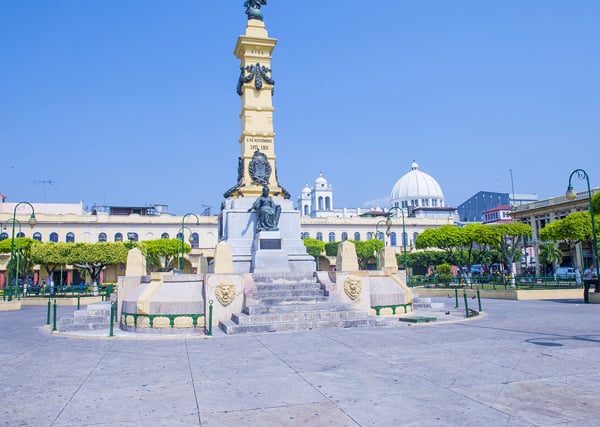Public Transportation in San Salvador
Summary: Learning how to get around using public transportation in San Salvador is an important step in adjusting to life in San Salvador. In this article, we cover the local public transportation options.

Public transportation in San Salvador, the capital city of El Salvador, is diverse and extensive. The city is served by a variety of transportation modes including buses, taxis, and a recently introduced bike-sharing program. The bus system, run by Sistema Integrado de Transporte del Área Metropolitana de San Salvador (SITRAMSS), is the most widely used form of public transportation. Taxis are also a popular choice, especially for expats and tourists. The bike-sharing program, Biciudad, is a newer addition to the city's transportation network. With these options, it is possible for an expat living in San Salvador to comfortably live without a car, relying on the public transportation system and walking.
Buses
The bus system in San Salvador is extensive and affordable, making it a popular choice for both locals and expats. The buses, often colorfully painted, run on a variety of routes throughout the city and surrounding areas. However, the system can be somewhat confusing for newcomers, as there is no official map or schedule. Despite this, many expats find that they can navigate the system with a little practice and local help. The cost of a bus ride is typically around $0.20, making it a very affordable option. While the buses are generally safe during the day, it is recommended to avoid them at night, especially if traveling alone.
Taxis
Taxis are another common form of transportation in San Salvador. They are a convenient option for those who prefer not to navigate the bus system or for trips that are not easily accessible by bus. Taxis in San Salvador are metered, and the fare is usually quite reasonable. However, it is always a good idea to confirm the fare before starting the trip. Taxis are generally considered safe, but it is recommended to use a reputable company or call for a taxi rather than hailing one on the street.
Biciudad
Biciudad, San Salvador's bike-sharing program, is a newer addition to the city's transportation network. The program was launched in 2017 with the aim of promoting sustainable transportation and reducing traffic congestion. Biciudad stations are located throughout the city, making it easy to pick up and drop off bikes. The cost of using Biciudad is quite low, with a monthly membership costing around $3. The bikes are a great way to get around the city, especially for shorter trips. However, it is important to note that San Salvador's traffic can be chaotic, so this option may not be suitable for everyone.
Walking
Walking is also a viable option for getting around in San Salvador, especially in the city center where many attractions are located close together. The city is relatively flat, making it easy to walk around. However, it is important to be aware of your surroundings, as some areas of the city can be unsafe, especially at night. It is always a good idea to ask locals or hotel staff about the safety of the area you plan to walk in.
In conclusion, while having a car in San Salvador can be convenient, it is certainly not necessary. The city's public transportation options are extensive and affordable, making it possible for expats to live comfortably without a car. However, as with any city, it is important to be aware of your surroundings and take precautions when necessary.
About the Author
 Joshua Wood, LPC joined Expat Exchange in 2000 and serves as one of its Co-Presidents. He is also one of the Founders of Digital Nomad Exchange. Prior to Expat Exchange, Joshua worked for NBC Cable (MSNBC and CNBC
Primetime). Joshua has a BA from Syracuse and a Master's in Clinical and Counseling Psychology from Fairleigh Dickinson University. Mr. Wood is also a licensed counselor and psychotherapist.
Joshua Wood, LPC joined Expat Exchange in 2000 and serves as one of its Co-Presidents. He is also one of the Founders of Digital Nomad Exchange. Prior to Expat Exchange, Joshua worked for NBC Cable (MSNBC and CNBC
Primetime). Joshua has a BA from Syracuse and a Master's in Clinical and Counseling Psychology from Fairleigh Dickinson University. Mr. Wood is also a licensed counselor and psychotherapist.
Some of Joshua's articles include Pros and Cons of Living in Portugal, 10 Best Places to Live in Ireland and Pros and Cons of Living in Uruguay. Connect with Joshua on LinkedIn.
Additional Information:
- 7 Weekend Getaways for Digital Nomads Living in San Salvador
- Best Bookstores and Libraries in San Salvador
- Fun Classes for Expats Living in San Salvador
- Public Transportation in San Salvador
- Best Markets in San Salvador
- Retire in San Salvador Guide
- 7 Tips for Living in San Salvador
- Pros & Cons of Living in San Salvador
- Tips for Expats Driving in San Salvador
- Cost of Living in San Salvador
- Health Care in San Salvador
- The Essential Guide to San Salvador
- Healthcare & Health Insurance in El Salvador
- Best Places to Live in El Salvador
- Real Estate in El Salvador
- Pros & Cons of Living in El Salvador
- Christmas in El Salvador
- Pros and Cons of Living in El Salvador 2025




